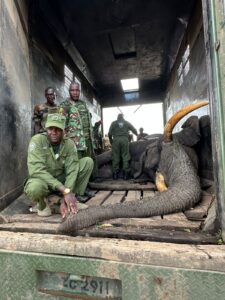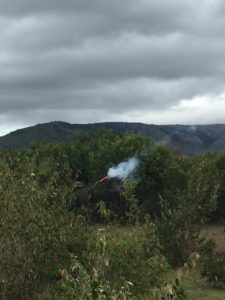
In the second quarter of 2019, MEP patrol rangers have been busy mitigating human-elephant conflict and intelligence rangers have had many notable arrests and ivory seizures along with the Kenya Wildlife Service (KWS) and Tanzania National Parks Authority (TANAPA). Pictured left: a flashbang being used by a MEP ranger to move elephants out of crops.
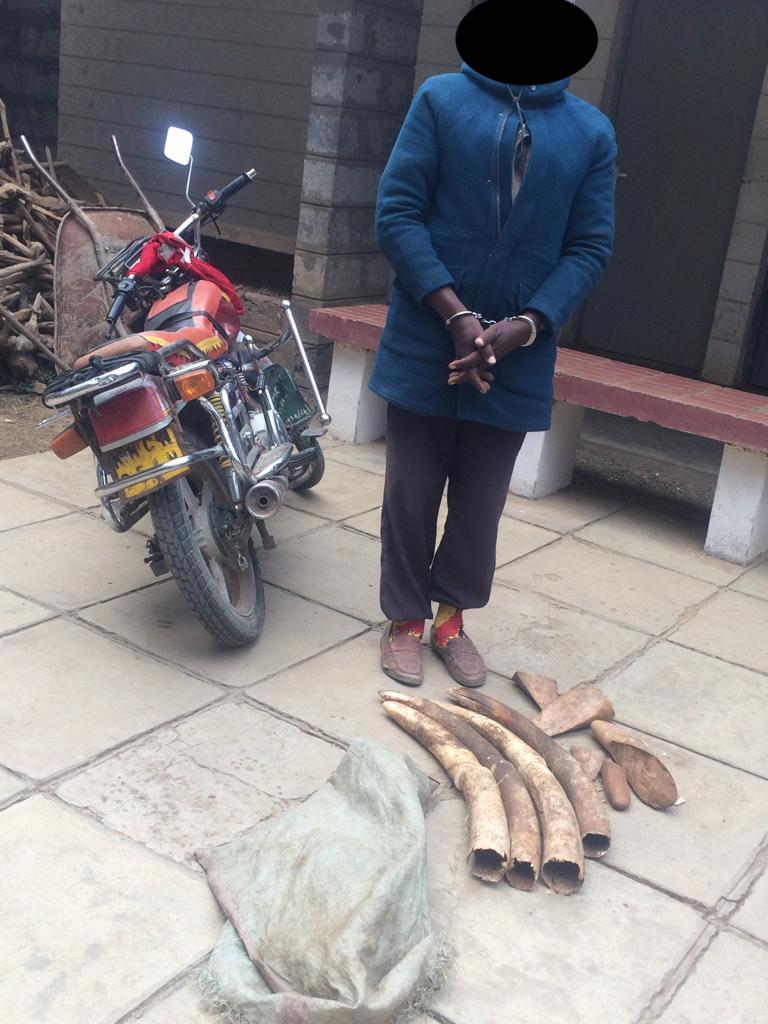 One suspect arrested on April 10 in possession of 13 kg of ivory.
One suspect arrested on April 10 in possession of 13 kg of ivory.
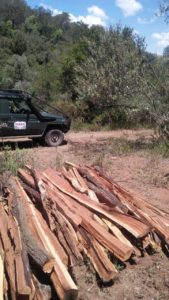
In total, in the second quarter, MEP ranger units removed 43 snares, uncovered and destroyed fivepoacher’s camps, confiscated 40 cedar posts, over 370 wood posts, one drop spear and destroyed three kilns and over 16 sacks of charcoal. On top of contributing to these totals, the Sheldrick Wildlife Trust Mau Team also recovered more than 70 kg of illegal bushmeat in the Mases area in May and continues to increase the protection of the Mau Forest. Finally, in the second quarter, MEP rangers assisted the KWS Vet Dr. Limo with the Sheldrick Wildlife Trust Mara Mobile Vet Unit in two elephant treatments. Pictured right: 60 posts recovered in Loita in April.
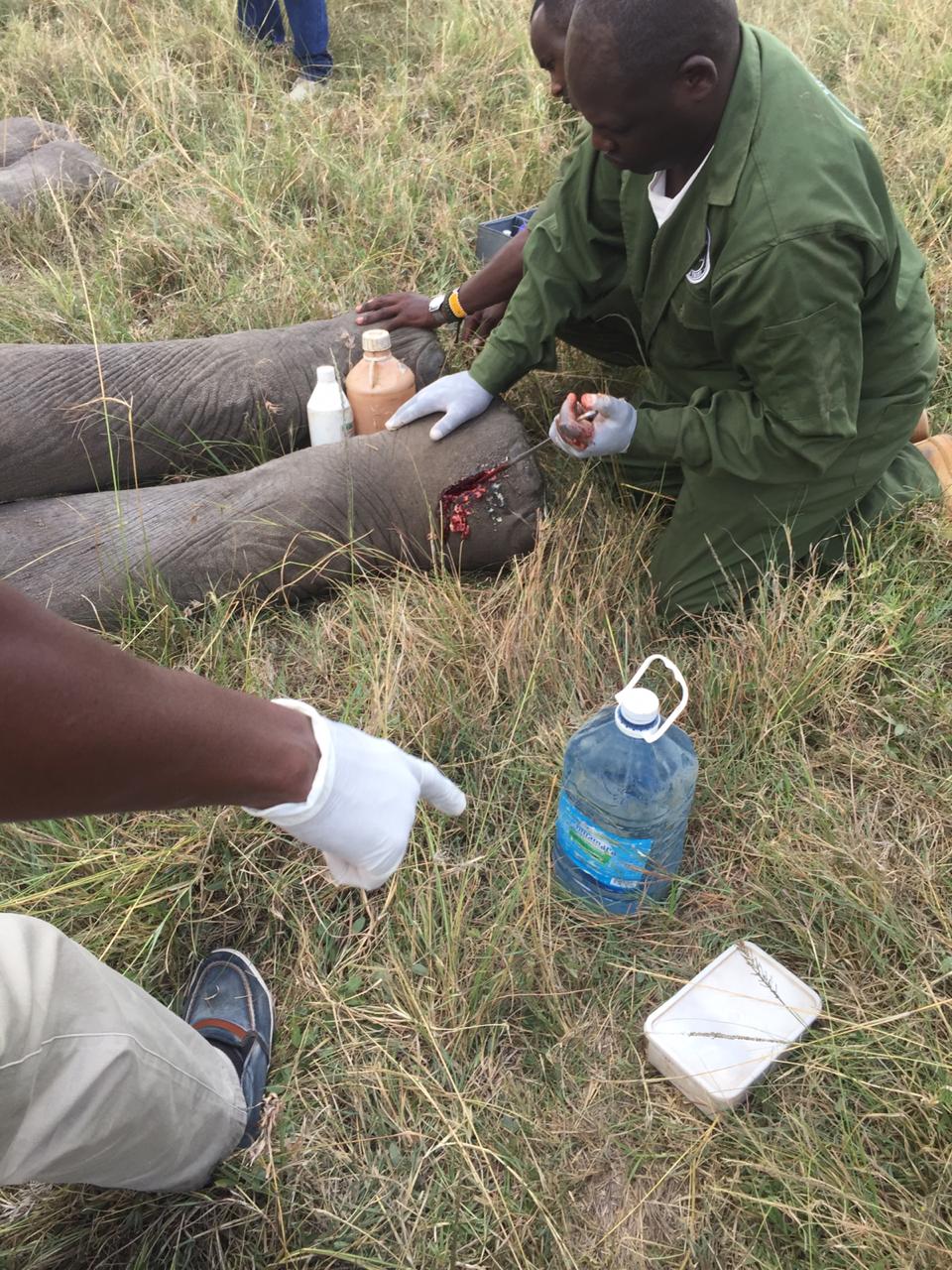 An elephant treatment being done by Dr. Limo in May.
An elephant treatment being done by Dr. Limo in May.
 The intelligence team was responsible for eight notable ivory arrests by KWS and TANAPA in the second quarter of 2019 and the seizure of 120.6 kg of ivory (21 kg in April, 40 kg in May and 59.60 kg in June). Though MEP’s anti-poaching focus is to stop poaching before it happens, successfully arresting suspects and seizing ivory is key to increasing the opportunity cost for poachers and keeping elephants in the ecosystem safe. MEP’s rangers are at the forefront of our anti-poaching operations and human-elephant conflict mitigation efforts through boots on the ground initiatives, living out in the field for up to two-months at a time. MEP needs to fundraise for the monthly running costs for core intelligence operations ($72,000 a year) and the existing operations cost ($46,000 a month) for MEP anti-poaching and rapid response units to continue to make an impact in the field. This includes support for salaries for rangers, rations, the cost of running vehicles and stipends for attached rangers from KWS. Key to the effectiveness, morale and retention of rangers is on-going training and development. MEP aims to provide ten days of training per annum per ranger at a total cost of $21,000 for MEP ranger training and development in 2019.
The intelligence team was responsible for eight notable ivory arrests by KWS and TANAPA in the second quarter of 2019 and the seizure of 120.6 kg of ivory (21 kg in April, 40 kg in May and 59.60 kg in June). Though MEP’s anti-poaching focus is to stop poaching before it happens, successfully arresting suspects and seizing ivory is key to increasing the opportunity cost for poachers and keeping elephants in the ecosystem safe. MEP’s rangers are at the forefront of our anti-poaching operations and human-elephant conflict mitigation efforts through boots on the ground initiatives, living out in the field for up to two-months at a time. MEP needs to fundraise for the monthly running costs for core intelligence operations ($72,000 a year) and the existing operations cost ($46,000 a month) for MEP anti-poaching and rapid response units to continue to make an impact in the field. This includes support for salaries for rangers, rations, the cost of running vehicles and stipends for attached rangers from KWS. Key to the effectiveness, morale and retention of rangers is on-going training and development. MEP aims to provide ten days of training per annum per ranger at a total cost of $21,000 for MEP ranger training and development in 2019.
The second quarter months see some of the highest rates of human-elephant conflict (HEC) throughout the year with a total of 47 cases of HEC responses by MEP rangers. Maize crops in the Munyas area were ripe and as a result the Munyas HEC team reacted to conflict in this area on a daily and nightly basis using bright lights, vehicles, fire crackers and loud drums to move elephants out of farms and into safety. A number of farms have already been destroyed and farmers have retaliated by shooting elephants with arrows. We have met this challenge by deploying this team at night to safely chase the crop-raiding herds before they enter too deep into the farms. As a response to an increased conflict season, an HEC meeting was held at Kimelok School in the Oloonkolin area in May. Among the stakeholders; KWS Kilgoris Warden, MEP, MNC and the Oloisukut Conservancy all attended. The objective was to discuss the long- and short-term solutions to the continuing conflict in this area. The long-term solutions discussed were: building a twenty kilometers electric fence to prevent the wild animals not to raid the crops across the river; employing some people as part of the rangers. The short-term solutions discussed were; putting the solar lights in all hot spot crossing areas to stop the elephants from crossing into farmland and increasing the ranger’s patrols to both day and night to move the elephants back as part of the quick response help.
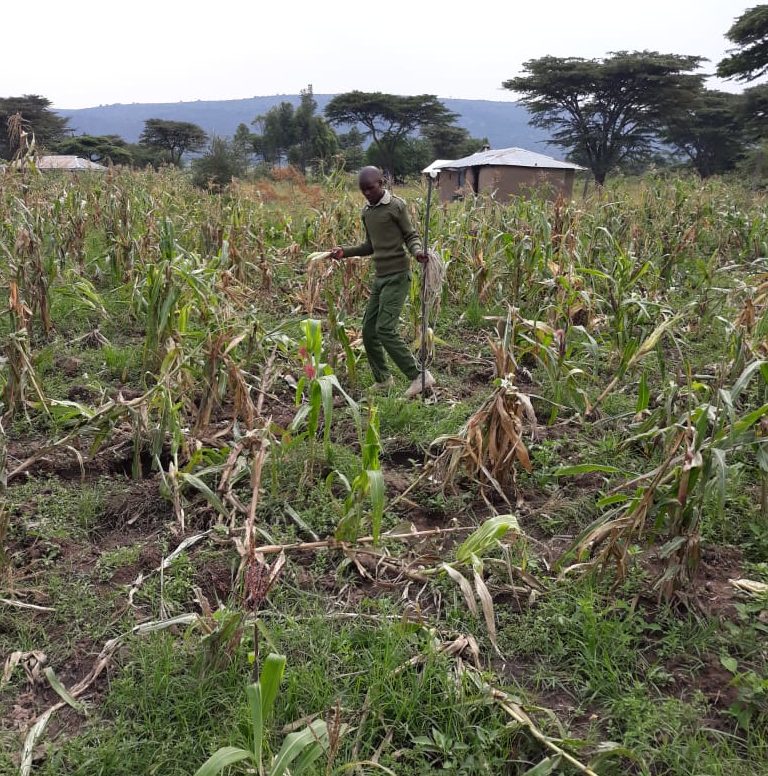
A MEP ranger assessing crop damage in June.
MEP operates in the unprotected areas of the Mara ecosystem and therefore collects constant data on areas that experience high human-elephant conflict. Our rangers in the field are seeing firsthand the impacts that a growing human population are having on the elephants in the ecosystem and there needs to be space set aside for both. One of the key needs for MEP in 2019 is a comprehensive community survey of areas that consistently experience high levels of human-elephant conflict. To support a full-time community liaison officer for MEP as well as their transportation, laptop, meeting and survey expenses would be $28,000 a year. We’re using our EarthRanger database to collect valuable information on the type and extent of human-wildlife conflict (HWC) incidents. We hope the data being collected and analyzed will help us refine our tool kit of how to help prevent elephants from crop raiding. The interface between humans and wildlife is only going to grow as populations expand and we need better ways of handling and preventing HWC.

The MEP Ranger School Fees Facebook Fundraiser raised $2,350 with 35 people who donated online and one of MEP’s long-time supporters chipped in another $5,000 to ensure we met our goal of close to $7,500, which was then matched by a grant awarded to MEP last month from the JE Fehsenfeld Foundation. This means MEP has fully funded the 2019 Ranger School Fees program! Thank you to everyone for their support!


